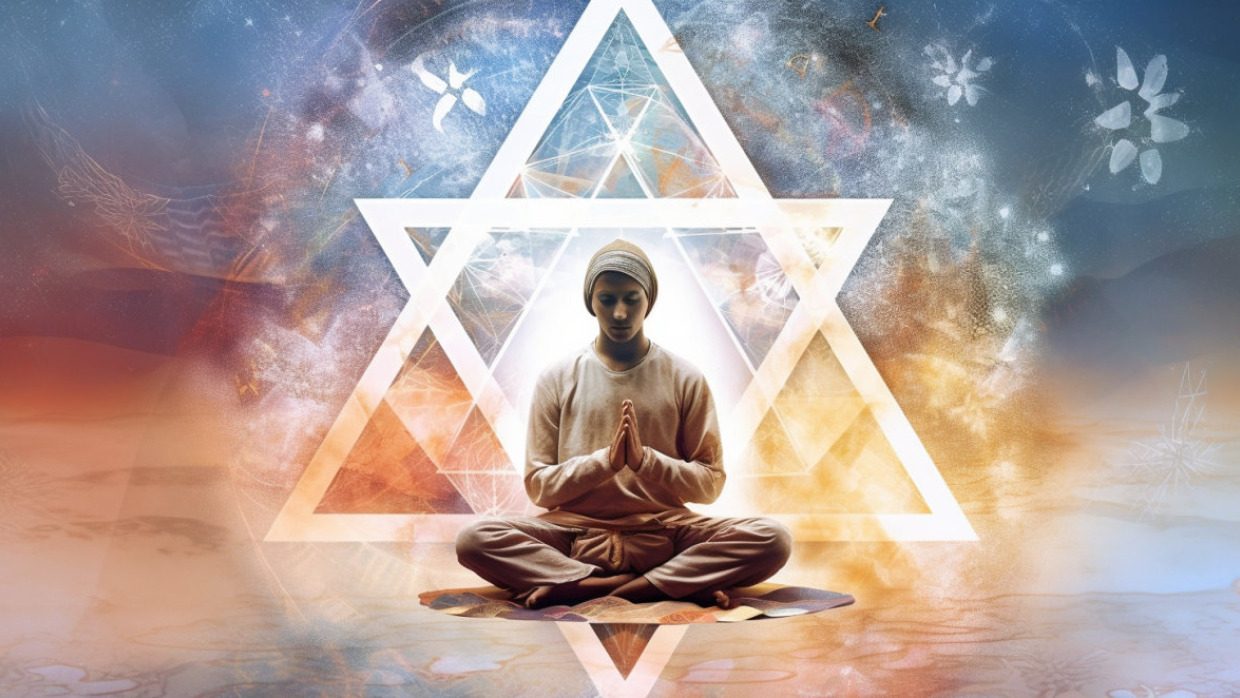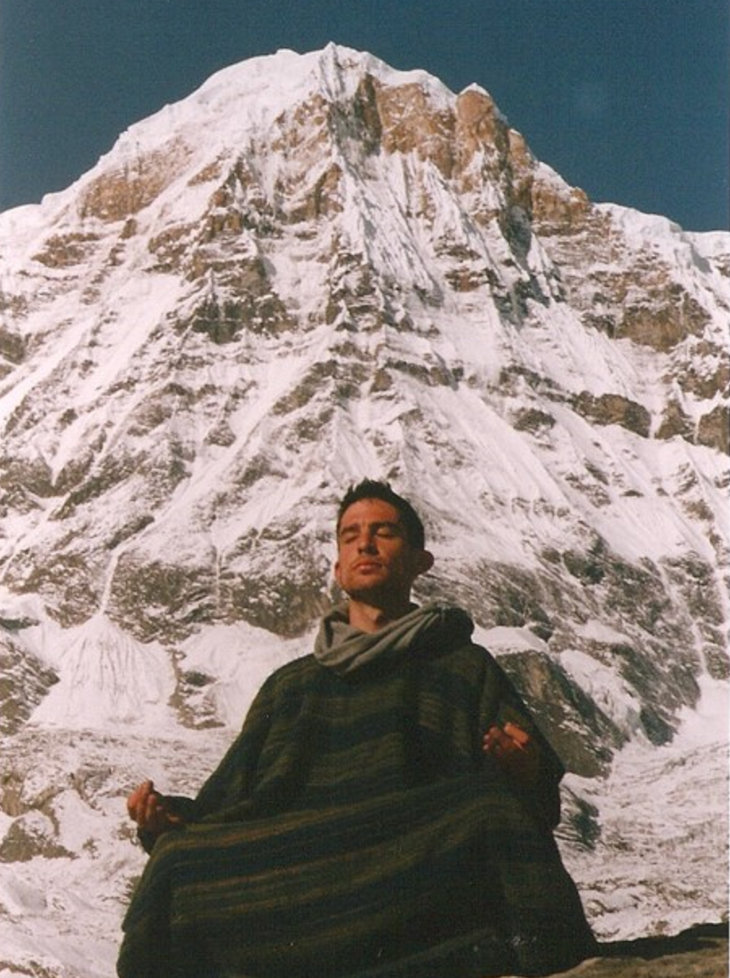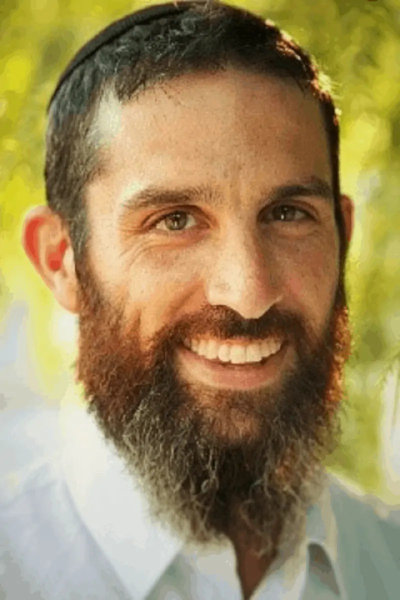 Vampire Weekend's Surprising Jewish Stories
Vampire Weekend's Surprising Jewish Stories


7 min read
I was surprised to discover the Judaism has a rich and deep tradition of meditation and spiritual practices for increased awareness and self-mastery.
It’s 4 AM.
I’m roused out of my uncomfortable sleep on the wooden bed with the wooden pillow, in a room barely big enough for the bed and my bag, by the incessant ring of the bell. I’m taking part in Wat Suan Mokh ten-day silent meditation retreat in Surat Thani Province, Southern Thailand.
I’m here with about 50 other foreigners all seeking peace of mind, mastery of thought, a quenching of desire, Nibana – Enlightenment. I emerge from under my mosquito net and make my way outside where I hear the splashing as participants pour buckets of cold water over themselves from the huge cement troughs in the courtyard.
I join in the ritual. There’s nothing like a cold bucket shower to wake you up in the morning.
We trudge towards the meditation hall as the first greyish light begins to reveal the silhouettes of the palm trees lining the surrounding hills. Fifteen hours later, we fall back into our wooden beds, another day of conscious breathing, conscious walking, conscious eating, consciously coming face to face with ourselves. Away from distractions - no TV, no phone, no reading, no writing, no computers, only one meal a day - just us and our thoughts.
Like many Jews seeking spirituality, I didn’t consider my own tradition a relevant place to find what I was looking for.
We are learning to focus all our attention on our breath, trying to discover the inner peace, bliss and higher awareness that lies underneath the constant babbling of the monkey mind…
Like many Jews seeking spirituality, I didn’t consider my own tradition a relevant place to find what I was looking for. The few religious Jews I saw didn’t seem so spiritually connected and what I knew of the religion seemed to me just a load of laws and details, too rigid for a free spirit like me.

Yet, after six years living in the Far East studying martial arts (black belt in taekwondo and brown belt in Aikido), partaking in several 10-day silent meditation retreats, yoga courses, fasting and hiking in the Himalayas, it was a great surprise for me to find that Judaism has a rich and deep tradition of meditation and spiritual practices for increased awareness and self-mastery.
The average American spends 90% of their waking hours looking at a screen. The mindfulness trend is a backlash to the rampant mindlessness.
The term Mindfulness is trending nowadays with mindfulness books selling millions of copies, yoga centers popping up all over, meditation apps flooding the market. This isn’t so surprising, given the trend it’s reacting to: rampant mindlessness. According to a recent survey, the average American spends 90% of their waking hours looking at a screen. Many people admit that the first thing they do when they wake up and last thing they do before they sleep is check their phones for messages and updates. Many work in front of a computer, in the bathroom they are checking their smart phone, in the gym there are screens, at home is TV, social media and Zoom on the laptop, and many go to the movies or sports bar on their night off. The average person has at least five notifications channels – Whatsapp, SMS, Instagram, phone and email, buzzing and beeping all the time.
Add to that Linkedin, Snapchat, Facebook, TikTok, Twitter, YouTube – we’re being constantly bombarded by things vying for our attention.
Part of the reason for this is that when we don’t have distractions we are left with possibly our worst enemy - our own mind. The voice in our head doesn’t stop from the second we wake up to the second we go to sleep. For many people, that voice is not the most uplifting, kind, sweet, positive companion to be stuck with. So we distract ourselves - which of course is not a real solution.

Rather than trying to escape from the mind, we need to learn to calm and control it, turning it from an enemy into our best friend. Your thoughts create your whole experience of life; therefore, it is imperative that we learn to start calming and controlling them.
The primary aim of meditation is to tame the mind, to stop it jumping around so fast and uncontrollably, to observe it, focus it, calm it down and experience the stillness hiding beneath. There are, generally, two types of meditation - passive and active.
Passive meditation is the exercise of quieting the incessant chatter of the mind. One way to do this is focussing all awareness on something in the present moment; for example, the breath or one of the five senses. In Jewish meditation this is called hashkata - quieting. When, inevitably, the mind starts up its chatter again, the key is not to get frustrated, just smile and return your awareness to the steady inhale and exhale of your breath.
Another meditation technique is habata - non-judgmentally observing all thoughts and emotions that arise and letting them pass through the consciousness without reaction or resistance. Rather than judging yourself, blaming others, fighting or engaging in the thought, we just watch it pass like a cloud in the sky, or a wave on the sea.
After a while, the breaks in between the thoughts get longer as the focus gets more consistent and effortless, at which point it feels like the deep peace you experience when the baby finally stops screaming and drops off to sleep at three in the morning.
We’ve all experienced this sublime state naturally for a few moments, perhaps
when listening to classical music or the birds singing in the park or feeling the sun
on our face on a beautiful spring day. Life is often like treading water, with constant waves of challenges, emotions and responsibilities rolling towards us. So much of our energy is taken up with thinking that on the rare occasions when we rise above our thoughts (even for a short while) it is like withdrawing onto the beach, finally resting, finding serenity and recharging.
Active meditation involves using the mind in a focused and controlled way to get deeper understanding into things, create certain thoughts, feelings and beliefs and approach life in a more positive and empowered way.
An example of this in Jewish teachings is hitbonenut – contemplation. Contemplating all the gifts we have in life arouses gratitude, contemplating the beauty and majesty of nature arouses awe, contemplating the fact that we won’t be here forever (in the right, healthy way) arouses purpose and vitality.

Jewish teachings are replete with references to meditative ideas and practices. The Torah teaches us “Don’t be drawn after your negative thoughts and desires.” Ethics of the Fathers, a collection of wise teachings of our sages, teaches, “Who is strong? The one who tames and controls their negative internal world” (4:1), and Kind David teaches that our spiritual and personal growth has to be done joyfully.
Joy is not dependent on external circumstances. It is a state of mind, a perspective on life.
In Hebrew, the word for being in joy is b’simcha, Joy is not dependent on external circumstances. It is a state of mind, a perspective on life. The Baal Shem Tov, founder of Hasidism, pointed out that the letters of the word b’simcha, in joy, also spell the Hebrew word “machshava” - thought. Your happiness is completely dependent on how you are thinking.
Calming your mind isn’t just a path to finding peace and happiness, it’s the key to revealing your Divine Essence - your soul. The word for breath in Hebrew is neshima, which shares the same root letters as the word for soul - neshama. The Torah teaches that God imbued Adam and Eve with a Godly soul by blowing from His own essence to give them life and vitality. By focusing on our breath and the life force it gives us, we can come into contact with our Divine Soul.
From ashrams in India to monasteries in Thailand, Himalayan hikes and martial arts on a Korean beach, I took a long journey to discover that what I was looking for was at home all along.
Rabbi Dov Ber Cohen runs an online Authentic Jewish Mindfulness Course looking into the wisdom and tools you need to develop physical, emotional, mental and spiritual health, vitality and wellbeing www.litmindfulness.org
